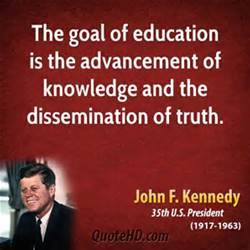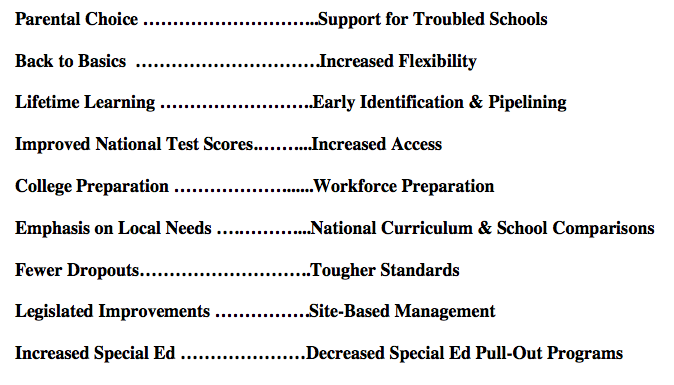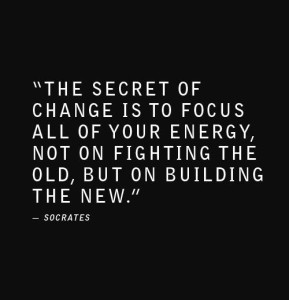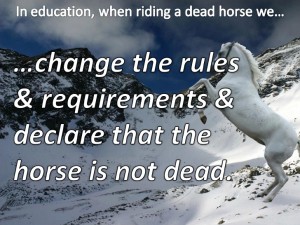Some people believe the United States is already a totalitarian state. If that is our reality, it doesn’t mean we can’t regain our status as a republic.
“Corporate totalitarianism means total control by corporate interests…. What’s happening in the United States today is a corporate coup of the U.S. government, and anyone who isn’t grieving that must not be looking.” Corporate Totalitarianism, or Not, Opinion by Marianne Williamson
Well, let’s look deeper into what “totalitarian” means because we can’t beat back what we don’t understand.
can’t beat back what we don’t understand.
Totalitarian power by definition is considered to be…
“…of or relating to a political regime based on subordination of the individual to the state and strict control of all aspects of the life and productive capacity of the nation…”
I’m sure that during the Kennedy presidency, foreign totalitarian regimes were the concern. But what JFK stated back then can be used in the fight we must take-on today. To win this battle, our citizenry …
“[It] requires skilled manpower and brainpower to match the power of totalitarian discipline.”
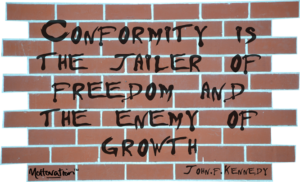 Kennedy’s words were in reference to what he called “the keystone in the arch of freedom and progress “— education. Now, with corporate-elite totalitarianism being an internal threat to our nation, people must recognize and resist conforming to corrupted laws for the sake of conformity.
Kennedy’s words were in reference to what he called “the keystone in the arch of freedom and progress “— education. Now, with corporate-elite totalitarianism being an internal threat to our nation, people must recognize and resist conforming to corrupted laws for the sake of conformity.
When the corporate-elite coup is focused on our lawmaking process, that is where it must be stopped.
We need brainpower? Not a problem. But, whom are we matching wits against? And how powerful is their discipline, their control over us?
That is where my passionate support for public education keeps me digging for answers. And I don’t like what I have found.
When the public education system is completely controlled and directed to focus on the “productive capacity of the nation,” then we are concentrating our manpower and money on one of the corporate-elites’ endpoints — the production of their labor supply. This is where we must focus our brainpower and consider what purposes we expect a public education system to serve.
Children do need to be employable. We all understand that.
But what I don’t get is the public’s willingness to let education be narrowed and controlled —made into a test-and-sort, data-collection system— to fill corporate workforce needs.
Who governs?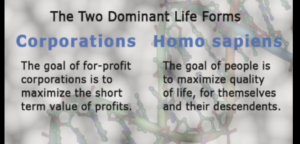
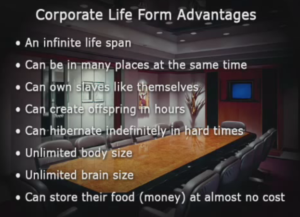 We know that currently, under the rule of law, corporations are considered people (people who never die). However, corporations alone can’t pull off this coup over control of public schools.
We know that currently, under the rule of law, corporations are considered people (people who never die). However, corporations alone can’t pull off this coup over control of public schools.
Organizations of all kinds, with a variety of political ideologies, have jumped on the “education reform” bandwagon. They are the ruling elite — ultra-rich individuals and foundations of all structures, sizes, and attractively deceptive names. And they are hiring people, just like you, to work on promoting and selling their agenda. (Recognize astroturf?)
Are we sure we want these groups — under the guise of philanthropic efforts and state control — in control of our productive capacity?
Consider this.
In The True Believer: Thoughts on the Nature of Mass Movements, Eric Hoffer explains that—
“… propaganda articulates and justifies opinions already present in the minds of the recipients.”
Now, think about this: How many parents have been frustrated at one time or another with something that happened in their public schools?
How many business owners have been frustrated at one time or another by hires who didn’t seem adequately prepared for work?
Same question, professors and college students, etc. … I’m NOT saying there is a HUGE problem; I’m saying there are some underlying unaddressed social tensions associated with public education. There has always been a constant desire to improve schools — as there should be. But that fact has been used against us.
Hoffer illuminates how leaders play on our emotions —
“…leadership articulates and justifies the resentment damned up in the souls of the frustrated.”
Because of frustration, we are vulnerable.
With the illusions of education reform thrust upon the nation, the massive changes aren’t fixing the real problems. The pseudo-reforms are only feeding the corporate State. And, yes, that is state with an authoritatively capital “S.” It is the Special Interest State that we all recognize exists.
America was given a choice long ago, but it was an “either/or” choice. (America’s Choice: High Skills or Low Wages) That’s a propaganda technique that creates a false dilemma. You have only two choices and you MUST pick one. It looks like we did. But there is nothing wrong with admitting we made a bad choice. Good leaders do that and then work to set things right.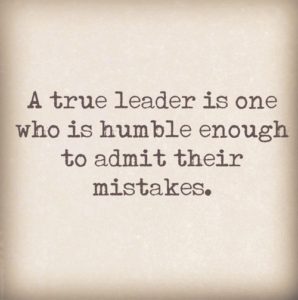
Where have all the true leaders gone?
The State — Big Money running what we used to call Big Brother (our government) — is no longer a republic. As Chris Hedges explains in Our Invisible Revolution,…
“Our shift to corporate totalitarianism, like the shift to all forms of totalitarianism, is incremental. … The ‘consent of the governed’ is a cruel joke. Barack Obama cannot defy corporate power any more than George W. Bush or Bill Clinton could.”
However, WE can defy them. You see, I believe this because of what I see. I see a corrupted federal education law that must be stopped. It can be stopped.
The “new” education law, the Every Student Succeeds Act (ESSA), is a perfect example of persisting totalitarian creep into the education of the next generation. ESSA continues the marketable propaganda of No Child Left Behind — accountability, flexibility, and choice — with the promise of State control. All the while, it’s moving the corporate-elite agenda of privatization forward by leaps and bounds. The law furthers corporate-elite control over what is becoming their workforce development system.

Between the Koch Brothers outright contributions, the ALEC (American Legislative Council) laws they push, and their funding of astroturf groups, these brothers will be hard to contain.
And now, it is obvious that the public education system is being used for other purposes. Here’s how.
We bought the plan to focus education on standards and outcomes. Standards control what is taught. Outcomes determine what needs reforming. Sound too simplistic? It is. But it worked for those wishing to control the system.
As we focused on math and reading standards for two decades, civics education suffered. … “Reformers” to the rescue!
The Koch Brothers Sneak into School. It’s real. It’s legal….and you are paying for it.
In addition, ESSA (a law pushed without the Consent of the People) establishes a Presidential Academy for civics instructors. Innocent enough? Perhaps. BUT when accountability for education is being left up to “the State,” who’s to say? How narrow will the civics instruction be? Who will be controlling the content? And who is training “our” educational leadership?
Convinced that this is some serious stuff?
Well, let’s look further at totalitarianism. It can be defined as…
“…tending toward monopoly.”
And there is no doubt; whether it is Bill Gates or the Koch Brothers, Big Money has monopolized education policy — from State to Federal and Federal to State — including local policies through the training of parents and school board members. This is the problem many of us have with Common Core National Standards. They aren’t just standards. They are based on a vision for a totalitarian workforce development system paid for by the public but privately controlled. The corporate-elite created the Common Core System. (America’s Choice?)
So, who is in control of the education of the next generation?
“Controlling information and controlling dissent are part of what goes into maintaining a totalitarian state,” said Jerrold Post, director of the political psychology program at George Washington University.
See why the public education system is such a big prize?
The anti-Common Core groups are fighting hard. The anti-high stakes testing groups are still battling after over two decades. Anti-charter/voucher groups are on the rise. Their individual efforts deserve our respect and admiration, but it hasn’t been enough to stop the coup.
To date, federal education law continues under the control of the corporate-elites. We are still only minor players.
“Through their control of politicians, political parties and corporate media, they do everything necessary to make sure that political candidates who resist them get nowhere near the levers of power.” Marianne Williamson
We, the populace, are rising. But,…
“An uprising that is devoid of ideas and vision is never a threat to ruling elites.” Chris Hedges
That is where the ideas and visions of JFK can still serve us well.
Totalitarian discipline did creep into education law. But we don’t have to comply with it. Civil disobedience is needed at every opportunity.
Reinforcements are a must. All the groups out there saying they are fighting against corporate-elite rule need to recognize where their strength and numbers are needed most. We know the corporate-elite takeover is real. We have the brainpower to match theirs. What we lack is the collective manpower focused where we can make a huge difference right now…. and in the future.
Join forces. Help stop the escalating takeover of our public schools.


